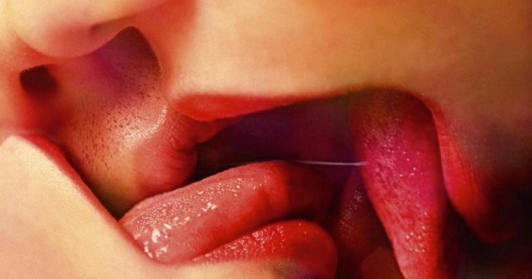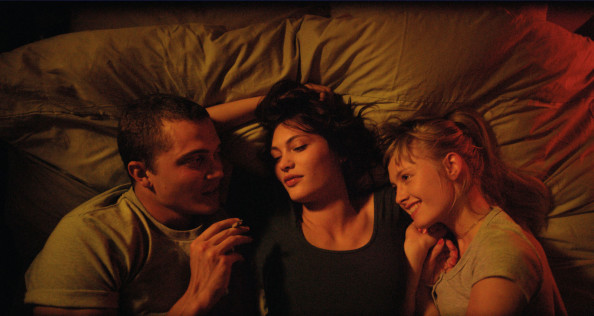[springboard type=”video” id=”1578725″ player=”tmbg001″ width=”599″ height=”336″ ]
Murphy is an American living in Paris who enters a highly sexually and emotionally charged relationship with the unstable Electra. Unaware of the effect it will have on their relationship, they invite their pretty neighbor into their bed.
Love, Gaspar Noe’s sexy sex filled art house adventure, uses 3D technology in two telling ways. In a more “artful” use, Noe uses 3D to layer many shots, creating a richer sense of depth that does nothing to enhance the experience. In its more playful use, a penis ejaculates semen seemingly out into the audience, directly into our collective faces. In both cases—whether in its subtler artsy way or in its bombastic use—it signals a far cry from the confident, angrier, whirlwind work of Noe’s previous films.
The provocation Noe goes for this time isn’t born of graphic violence, or anger, or even deep despair, it’s almost petulant. Highlighted by a lot of dirty but passionate sex scenes and a bunch of bratty twenty-something love, the provocation in Love is how much you can stand being heavily involved in someone else’s failing relationship. Using barely known actors (a gimmick among many) only heightens the feeling that we are trapped in a couples therapy that refuses to end. But it’s not just the relationship that wears on us. It’s everything here about life, not just love.
Karl Glusman is a relative no name who, from everyone I’ve spoken to about the film, apparently did a horrible job. Noe’s use of lesser known actors here didn’t only do little for the spirit of the film, in Glusman’s case he actively hurt it with his wide-eyed and weak convictions about art, love, sex, life, pretty much everything. Glusman plays Murphy, who is married with a child, and is predictably miserable. He whines in inner monologue of how trapped and resentful he feels. But he hardly interacts with his family, left alone to wallow after receiving a phone call alerting him to the disappearance of his ex-lover, Electra (Aomi Muyock). Murphy abandons his present day woes and engages some older ones, and we jump into flashbacks upon flashbacks of Murphy and Electra’s passionate, but doomed relationship. Love is not full of anger and pain, and it is much less antagonistic towards the audience than Noe usually likes his films to be—this is a bad thing.
Though the sex is plentiful and incredibly graphic, it creates an easy unease in the audience, and is a far cry from the intense provocations of either Irreversible or Enter the Void (or even his first film, I Stand Alone, which is akin to psychological and philosophical assault). But what is Love full of? Bullshit? Any scene that doesn’t have sex in it falls into one of two categories—petty arguments or borderline bad comedy. The sex—whether it’s in sex clubs, an orgy, ménage a trois, a fling in the bathroom, mostly monogamous but not totally—is kind of just there. It doesn’t reveal much about our characters besides the obvious that as their bond begins to break their sex life gets crazier. But a threesome with a transsexual sadly is played for stereotypical laughs. Most of their sexual adventure is clumsy in the most predictable ways.
But Love also brought to mind L’Avventura—this is a good thing—the sudden disappearance of Electra reminiscent of the mid-film climactic shift in Antonioni’s offbeat mystery (in neither film do we find the missing person, a troubled romance becoming the focus instead). There’s also the mysterious way drug addiction is handled. We catch it in glimpses, through doors cracked open, or as punctuation after a roll in the hay. Electra’s disappearance is linked to her growing drug use, and this coupling of information is intriguing, though it’s not followed up enough to feel essential. Noe’s jaunt through drug addiction, as well as the repetitive screeching between the lovebirds, doesn’t crescendo. Dialogue like “you are the love of my life,” and “I want a nice family with someone who thinks love exists” stands in as sentimentality, though Noe’s sentimentality is usually more purposefully and passionately expressed. Whether a character is bashing in the face of the wrong man to avenge his girlfriend, or the ghost of a man watches as his sister mourns her loss while hugging a teddy bear in the strip joint she dances at, Noe’s success has been sentimentality in the face of pure brutality. Love may be going for something softer, but too soft so that the sex is bad.
Richard Linklater’s Boyhood suffered from a similar problem. When you call your film “Boyhood,” or “Love,” the expectation will be that you have something profound and definitive to say of the experience. But Linklater passed boyhood off as a lite version of Tree of Life combined with a prolonged film experiment (that had already been done, at that). And Noe has turned love into an art house porno. It’s not really pornography, in the masturbatory sense. But it’s hard not to see it as shock value, although it does set a new standard in the recent art house tradition of showing off the dirty deed in giddy glory—beating out Guiraudie’s Stranger by the Lake, Von Trier’s Nymphomaniac, and any number of sex peddling films. But sex isn’t all there is to making love.
- Acting - 3/103/10
- Cinematography - 7/107/10
- Plot/Screenplay - 4/104/10
- Setting/Theme - 7/107/10
- Buyability - 5/105/10
- Recyclability - 5/105/10
Overall
Warning: Illegal string offset 'Movie' in /home/themov15/public_html/wp-content/plugins/wp-review-pro/includes/functions.php on line 2358








